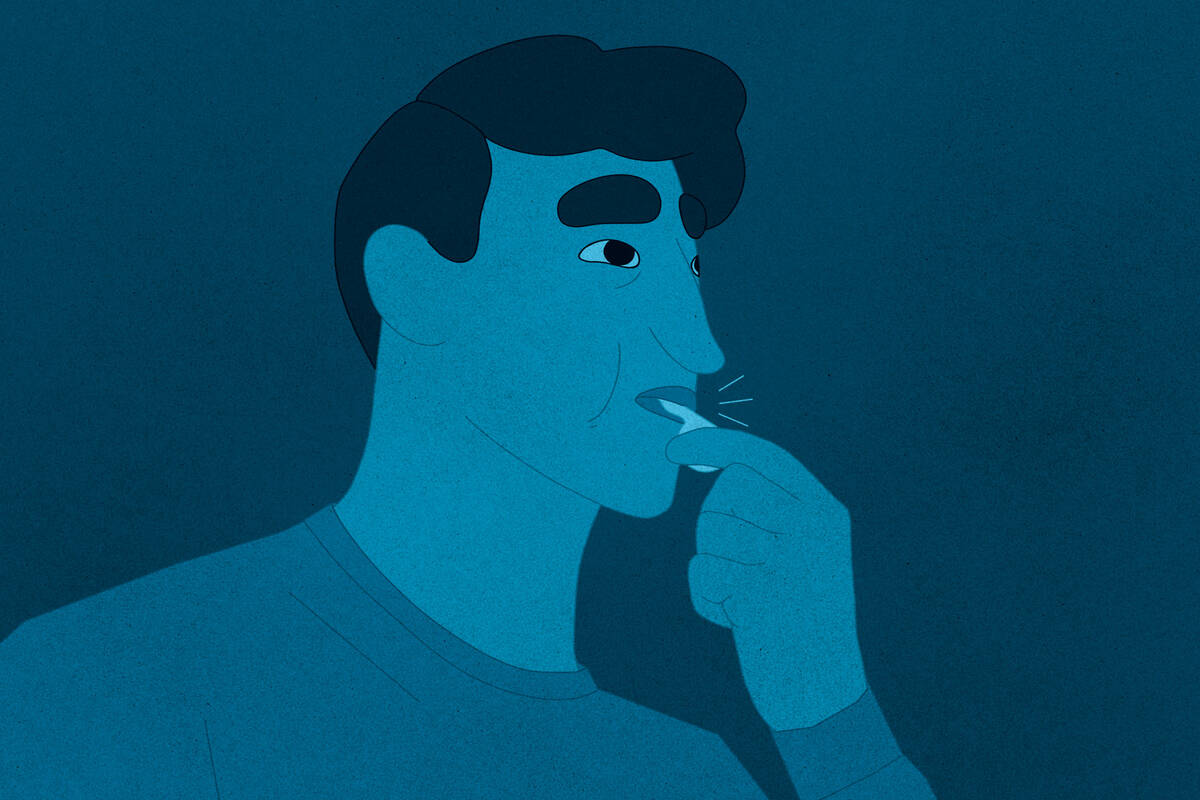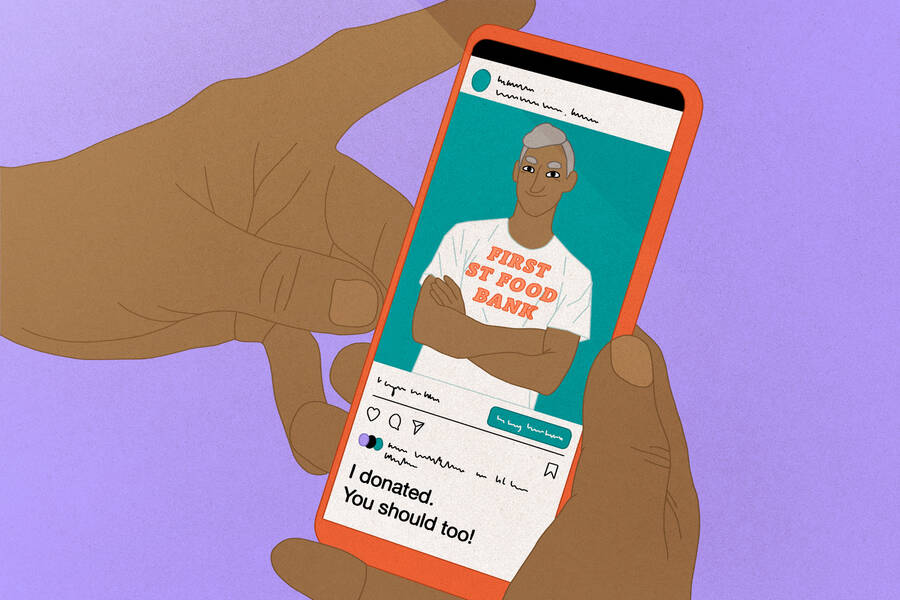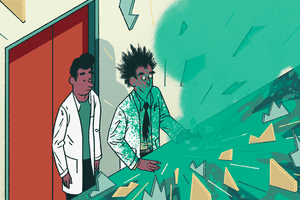Organizations Careers Feb 1, 2024
Are Whistleblowers Seen as Heroes or Snitches? It Depends.
Reporting workplace misconduct often requires choosing between morality and loyalty. New research explores how that trade-off is viewed by others.

Lisa Röper
Imagine a close friend from work confides that he’s been submitting false expense reports and pocketing gobs of cash.
It’s a stomach-churning dilemma: you can inform your manager about the transgression, or you can stay loyal to your friend and keep your lips zipped. Which path is seen as the morally righteous one?
There are no easy answers here. “The classic view from morality research is that being loyal and being moral go hand in hand,” says Ike Silver, an assistant professor of marketing at the Kellogg School. But, according to new research, whistleblowers must pick “between being seen as a loyal friend and being seen as a morally upstanding member of the community,” he says—both worthy goals.
Silver’s new research digs into these tricky ethical trade-offs. For the recent paper “Moral Paragons, but Crummy Friends: The Case of Snitching,” Silver and his coauthors, Zachariah Berry of Cornell University (a PhD student who led the project) and Alex Shaw of the University of Chicago, ran a series of studies to determine how people perceive those who turn in their coworkers.
Their findings offer a nuanced look at how whistleblowing is viewed in the workplace. In the studies, actors were seen as more moral—and better leaders—if they turned in coworkers guilty of immoral transgressions such as stealing, regardless of whether the person was a friend or merely an acquaintance. Employees who stayed mum were seen as less moral, despite seeming much more loyal. Interestingly, whistleblowers were also found to be more hirable; the act of turning in a colleague—even a close friend—for wrongdoing signaled that the whistleblower would make a good employee, according to the study.
There are caveats. For example, if the whistleblower had an ulterior motive (like disliking the coworker who committed the offense), they weren’t seen as especially moral, because their actions could be ascribed to personal animus. Also, if the transgression stemmed from incompetence rather than deviance, the whistleblower racked up fewer morality points—that is, there were no benefits for exposing a coworker’s professional shortcomings.
Immoral snitches or upstanding snitches?
Silver and his colleagues weren’t sure exactly what they’d find when they started the research. Both honesty and loyalty are important and widely held values, and loyalty to friends and close others is particularly prized.
For that reason, they had two competing hypotheses. The “Immoral Snitch” hypothesis, as they called it, predicted that snitching on friends would be negatively viewed, particularly in comparison with snitching on acquaintances. After all, being loyal to friends means protecting them. By contrast, the “Upstanding Snitch” hypothesis suggested that people might get credit for blowing the whistle, regardless of their relationship to the transgressor. In other words, people might think bringing bad behavior to light is the right thing to do, even—and maybe especially—when it means calling out friends.
The researchers conducted six studies to test these competing theories and delve into the nuances of how whistleblowers are perceived.
“Sometimes, you just witness something, and now all of a sudden, you’re in this reputational trade-off trap.”
—
Ike Silver
In one online experiment, 200 participants were presented with written scenarios about workplace transgressions and the actions of witnesses who found out about them.
One such vignette detailed two employees at a major technology company. While together at a conference, one of the employees confides that he has been stealing computer code from another coder. The authors randomly presented participants with one of four versions of this scenario, which varied in whether the witness turned in the transgressor and whether the two employees were close friends or just acquaintances.
After reading the scenarios, people were asked to rate how morally the witness acted, how loyal he was for turning in (or not turning in) a friend or acquaintance, and whether he would make a good leader.
The results supported the “Upstanding Snitch” hypothesis: the witness who snitched was judged to be much more moral than the one who did not. He was also seen as a better leader. Importantly, ratting out a friend wasn’t found to be any less moral than turning in an acquaintance (despite entailing much stronger disloyalty). To onlookers, then, the right thing to do is to report improprieties when they emerge—no matter how close you are to the wrongdoer, the results showed.
The type of violation and motivation for reporting it matter
A subsequent study concluded that the type of violation mattered in how an informant’s morality was perceived. Participants again were presented with scenarios in which someone decided to inform or keep mum about an employee who was either a friend or acquaintance. But half of those surveyed were told that the witness learned about a coworker’s immoral behavior (e.g., stealing a computer code), while the other half learned about incompetent behavior (e.g., being a bad coder).
Among participants who read about immoral behavior, raising the issue to management was once again seen as the more moral choice, whether the transgressor was a friend or acquaintance.
But participants did not see reporting on incompetence in the same light. Witnesses who told the boss that their coworker was a bad coder were not seen as any more or less moral than those who did not, and these moral evaluations did not differ whether the witness was a friend or acquaintance.
The results suggest that while bringing immoral behavior to light is seen as the right thing to do, telling on a coworker’s bad performance doesn’t earn any points.
“If what you are doing is concealing your friend’s immoral behavior, then people think you’re doing wrong, too,” Silver says. “If you’re concealing your friend’s incompetent behavior, that seems to be just fine.”
To examine the effects of self-interest on snitching scenarios, researchers set up another study that involved ulterior motives for the snitch.
Again, they presented scenes in which someone decided to inform or not inform on a transgressor, but this time the wrongdoers were either work friends or disliked coworkers. When people informed on adversaries, participants questioned whether they were acting out of genuine moral concern, or simply wanting to hurt someone they didn’t like. With ulterior motives at play, blowing the whistle wasn’t morally preferable to keeping quiet.
The team also conducted an experiment with one hundred human-resources students from Cornell University, people likely to handle the consequences of workplace misconduct in the future. Participants again learned about an employee who either did or didn’t turn in a friend’s immoral behavior. But this time, the researchers added questions designed to assess whether these future HR professionals see snitches as desirable employees. They did, the results showed: whistleblowers were seen as both more moral and more hirable.
Understanding the whistleblower’s dilemma
The results of these studies have implications for employees who find themselves in these tenuous situations. The study did not address the possibility of retaliation by the perpetrator or by the organization itself (or what might happen if one of these parties contests the facts at hand). But it does suggest that, in general, outside observers—and perhaps your next HR team—value justice over loyalty and often commend those who come forward.
The study also has implications for employers who are looking to build a fair and honest culture in the workplace.
“Organizations often want to inculcate loyalty among their employees, and they will use phrases like ‘We’re all a family here,’” Silver says. “Such language may have the inadvertent consequence of shifting people to weight loyalty more heavily when they’re thinking about whether or not to bring bad behavior to light.”
The authors also noted that perhaps we should all be more empathetic to whistleblowers.
“Sometimes you hear things like ‘Oh, they should have come forward sooner,’” Silver says, when in fact the choice they face is daunting, and the decision to come forward at all has complex reputational implications.
“Witnesses don’t typically choose to be informed about others’ bad behavior, right?” he says. “Sometimes, you just witness something, and now all of a sudden, you’re in this reputational trade-off trap.”
So consider showing a little kindness to the much-maligned snitch, Silver says: “This research suggests that maybe we want to be a bit more understanding of the conflict that whistleblowers face when they are put in these situations.”
Amy Hoak is a freelance writer in Chicago.
Berry, Zachariah, Ike Silver, and Alex Shaw. 2023. “Moral Paragons, but Crummy Friends: The Case of Snitching.” Journal of Experimental Psychology: Applied.



